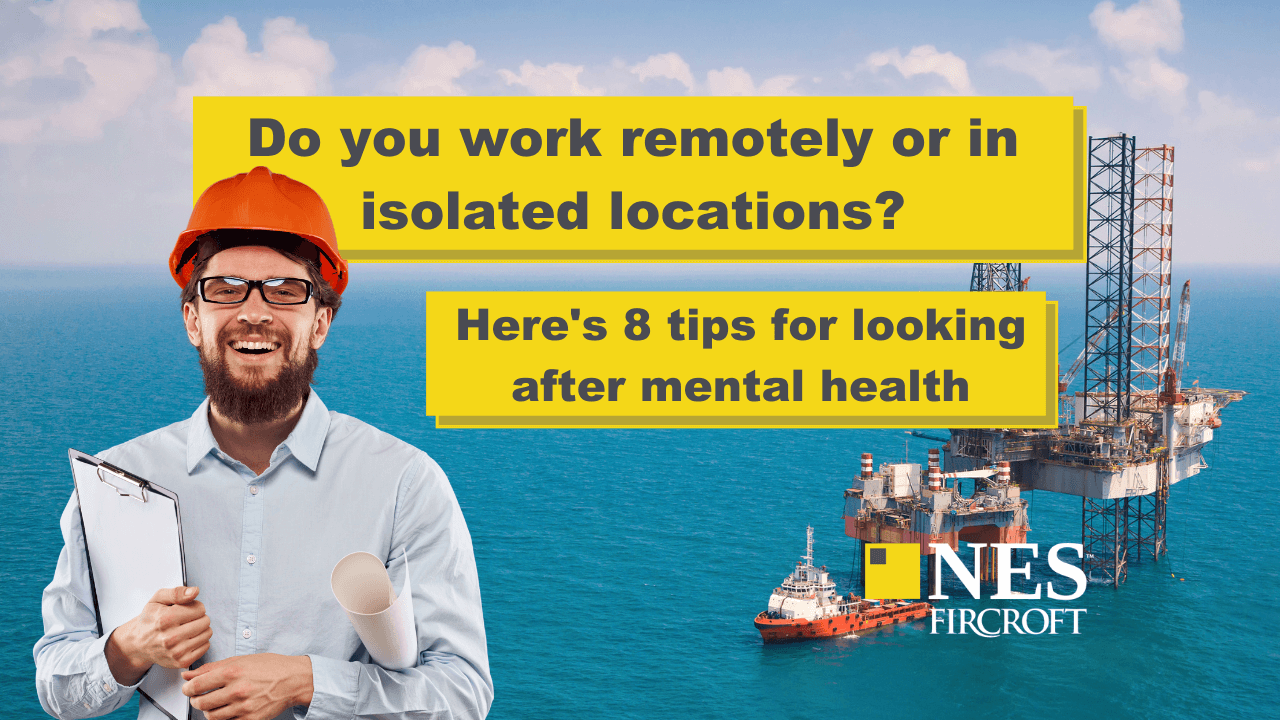How To Promote Strong Mental Health While Working Remotely Or In Isolation
28 Sept, 20225.18October 10th is World Mental Health Day. At NES Fircroft, we’re committed to supporting...

October 10th is World Mental Health Day. At NES Fircroft, we’re committed to supporting businesses and their employees in prioritising mental health and wellbeing. We understand the challenges of our industries, and how our working environments affect us, personally and professionally.
Remote working can mean different things - office jobs that combine home working and field work, working as an individual in isolated places with lots of travel, and even offshore work away from home and family life.
Stress and poor mental health can make being productive at work difficult– so if you work in an isolated location, here’s what you can do to look after your mental health.
The effects of poor mental health in the workplace
Without a good mental health provision in your workplace, it can be hard to open up about how isolation or stress is affecting you.
A study between Mental Health UK and YouGov found that 23% of remote workers (those who work entirely at home or a place in isolation) and hybrid workers (those that combine home and field work) felt that isolation had affected their mental health. Of those, 46% felt they wouldn’t feel confident sharing their feelings with their colleagues.
In the construction industry, as an example, these figures rise; 74% of workers said there was still a stigma around mental health in the industry.
Factors contributing to work stress in isolated workers include:
Blurred boundaries between work and home, meaning employees often work longer, with fewer breaks
A ‘full-throttle’ culture where workloads are poorly managed, or team members are kept overloaded
A lack of acknowledgement, where the focus is on what needs doing, rather than successes
Feeling isolated from colleagues, where conversations are online, structured, and short
A sense of poor collaboration when work is left without feedback or team support
A lack of culture, which is normally built around a task by the people doing it, rather than the task itself.

8 Tips for improving mental health in the workplace
So, how can engineers working remotely or in isolated locations look after their mental health?
Although employers themselves have a role to play when it comes to supporting their employees, here are a few of our top tips that you can try straight away to look after your mental health.
1. Maintain a good work-life balance
When working remotely, it’s easy to lose track of time and, working beyond office your agreed hours and with fewer breaks. When your work and home are the same place, the lines between them are easily blurred.
This can become even more apparent for those working offshore. The usual working shift for offshore workers is 12 hours ‘on’ and 12 hours ‘off’, and many shift patterns are a mixture of both day and night because operations run around the clock. Many offshore jobs require shift patterns of 2 or 3 weeks on the rig and 2 to 3 weeks onshore, but the patterns can be longer. If this applies to you, make the most of your breaks and setting boundaries to prevent work and downtime blurring into one.
If you work at home and in the field, it’s important to agree on hours with your employer that match the needs of the organisation and your own schedule. For office workers, look to set your task time into blocks, with short, regular breaks. Take lunch away from your desk or work area, minimising screen time if you can. For field work, ensure you take regular rest between physical tasks.
This applies to managers too – set a good example and look after yourself too!

2. Acknowledge that ‘working at home’ means someone working, in their home
Partners, pets, children, deliveries, and other distractions are the realities of combining the home and the office.
If you work from your home for some or all of all the week, managing this balance poorly can cause a feeling of insecurity at work, as well as feeling inattentive with other responsibilities, which increases stress.
Being distracted by a co-worker at work and being distracted by a child at home are two different scenarios, but the distraction has the same effect. The brain needs to switch quickly from one task to another, and back again.
Normalising distractions from the home or remote office, the occasional cat in a Zoom call, and making employees feel safe that they can take time to deal with both situations, creates a more compassionate and relaxed environment.
3. Set a time to catch up with friends and family
If you work in an isolated location, such as an offshore oil rig, living away from home for long periods can contribute to poor mental health. The absence of family and friends can be difficult to deal with and mobile signal is often unreliable, making traditional methods of keeping in touch tricky.
However, larger oil rigs will often have internet connections enabling apps such as Skype and other messaging services for uninterrupted communication with those back home. When you know your work schedule, put some time in for regular contact with loved ones so you can be on hand to celebrate any important occasions or simply catch up with their day-to-day lives.

4. Meet physically and plan in-person events
For many people, virtual meetings aren’t as effective as in-person meetings. In-person meetings are a chance for the team to be social and gain the benefit of physical and social cues that are difficult to spot in online meetings.
And while meeting up for work meetings can help boost team cohesion, organising in-person events that aren’t work related can also help against feelings of isolation or exclusion within a team. Mandatory ‘team-building’ days may be cliché, but consider going for a coffee after work, walking lunches and picnics are great opportunities for shared downtime.
5. Buddy Up
Working alone can cause feelings of isolation and exclusion. Some people can also struggle with motivation when working independently for long periods of time.
A simple solution is to ‘buddy up’. This can be a physical meeting regularly in person, or it can also be virtual, where two or more colleagues develop an open chat channel or regular meetings just to catch up, ask questions, or support each other’s work. These colleagues don’t need to be in the same team – just willing to work in the same space co-operatively.
6. Make time for physical exercise
Studies have found that, in remote jobs like wind turbine technicians, the level of routine and physical exercise makes a positive contribution to mental wellbeing. There are many other studies, and whole organisations, dedicated to spreading the connection between physical activity and mental health.
Schedule in time to get away from the desk or workspace, perhaps for a few minutes each day, or a couple of lunchtimes a week. This can be as simple as walking around the house and stretching, to taking short walks on lunch breaks.

7. Conduct Risk Assessments
Risk assessments that used to focus on physical risk are now also taking into consideration mental health risks and stress-related issues. If you are concerned about your mental health in the workplace, it’s important to communicate this with your employer so they can provide you with the support needed to succeed.
8. Set SMART goals, not time-based ones
Employees working from home or on rotation offshore, are often doing so for the flexibility so setting goals based on a traditional working schedule is counterproductive. On top of this, setting goals you’re unlikely to meet can cause distress leading to poor mental health.
Instead, consider setting weekly goals using the SMART methodology. SMART stands for Specific, Measurable, Achievable, Realistic, and Timely. This methodology focuses on the end goal of a project. By working with this model, employees can agree to targets that fix a more flexible daily schedule.
More Information on World Mental Health Day
Monday 10 October is World Mental Health Day, set by the World Federation of Mental Health, and is making mental health and wellbeing for all a global priority. You can learn more about World Mental Health Day here.
NES Fircroft and support for candidates
NES Fircroft is an award-winning workforce solutions specialist with over 50 years’ experience in placing engineering and technical personnel on some of the world’s most exciting energy projects from traditional Oil & Gas to the sustainable energy solutions of the future.
We have 80+ offices in 45 countries, managing over 25,000+ contractors and placing thousands of permanent staff every year, embodying 127 nationalities across 91 countries. Our recruiters are discipline-specific, meaning that they truly know their markets and are expertly positioned to help you advance your career.
Looking for a new role? Browse our job vacancies.










